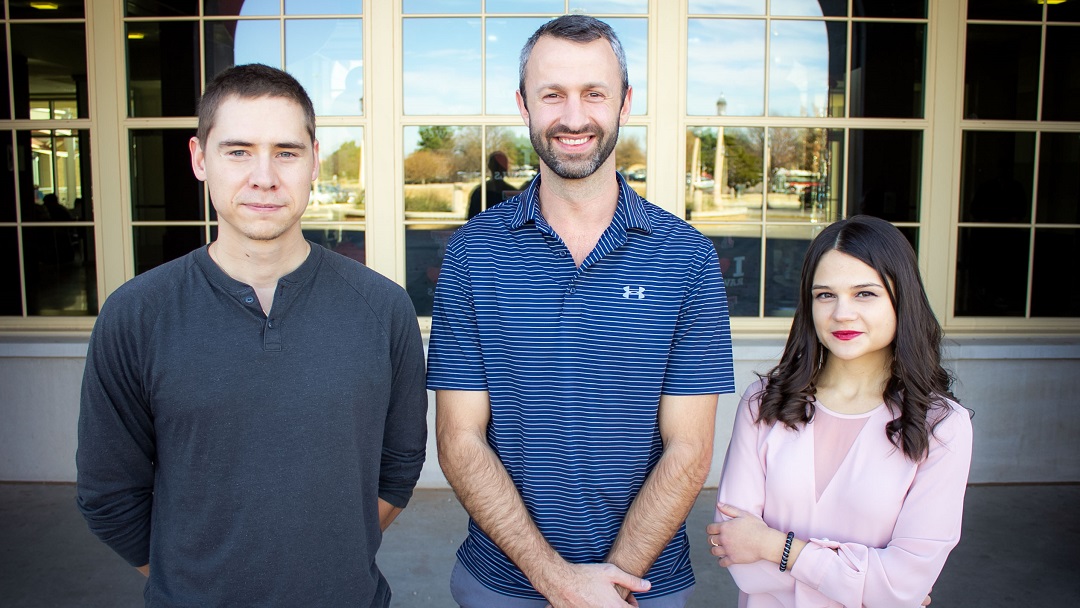
Rawls College students placed in the top 10% percent among 479 teams from across the U.S. in the Humana Case Competition.
Matt Patch, Pavel Panko and Anastasia (Nastia) Trofimenco, all enrolled in the Masters of Data Science program at the Jerry S. Rawls College of Business, competed in the third-annual Humana Case Competition this semester. More than 1,300 masters level students representing 479 teams from 81 universities in the United States registered to compete for over $50,000 in scholarships.
Sponsored by health and well-being company Humana Inc. and Mays Business School at Texas A&M, the competition tests graduate students' abilities to solve problems and utilize solutions to create practical business opportunities.
"The use of analytics in healthcare is becoming increasingly more important in driving better patient outcomes and reducing the cost of care," said Bruce Broussard, President & CEO, Humana Inc. in an initial announcement about the competition. "Giving students the opportunity to engage in real-life scenarios through this competition is a meaningful way to challenge and shape them as professionals."
This year, each team's goal was to identify members at risk for continued long-term use of opioid therapies, allowing for early intervention. The team received the case topic via email in September and had less than a month to develop their solutions and recommendations.
Students had access to real anonymized data from Humana Inc. and were encouraged to use data analysis tools, such as Splunk, R, Python, SAS, Tableau and Microsoft BI to help them solve their problem.
"The most valuable thing I've learned throughout this program is knowing where to turn when you hit a dead end. Understanding what resources are available and getting comfortable devising solutions extends the learning experience beyond the walls of the classroom. This is especially important when you're tasked with work that pushes your limits," said Patch.
Although their participation in the competition was not part of a student organization or class, the team received encouragement from data science faculty at Rawls College.
"The faculty in the Information Systems and Quantitative Sciences (ISQS) area were extremely helpful: from Dr. Lucus, who nominated us for the competition, to Dr. Zadeh, who ensured we had meeting space available every week," said Panko. "Throughout the process, we felt a great deal of support which inevitably translated into quality work."
Despite their busy schedules, the team remained committed to the competition. They relied on teamwork and time management skills to successfully form their solution.
"Win or lose, these competitions are great opportunities for our students to gain real-world experience and showcase their talents," said Alireza Sheikh-Zadeh, an assistant professor of practice in the area of Information Systems and Quantitative Sciences. "Even with demanding classes and a full schedule, they were able to make it to the semi-final round of one of the most well-known and challenging case competitions in the country."
Students were judged based on the following criteria: quantitative analysis, identifying key business insights, professionalism, data visualization, ability to accurately predict desired outcome, ability to provide unique insights for business improvements; and ability to establish key performance indicators aligned to business needs.
"Between our jobs and classes, the month-long competition was intense," said Trofimenco. "When it was all said and done, I felt like I had gained tangible experience which augmented my classwork and my proficiency as a data scientist."
While the team did not advance to the final round of five teams, David Lucus, director of data science programs at Rawls College, said the team should be applauded for their hard work and readiness to represent Texas Tech on a national level.
"Their success this year was a testament to their diligent teamwork and ability to put theory into practice to solve a real-world problem," Lucus said. "I hope that other Texas Tech students will be inspired to test their skills and compete next year."
